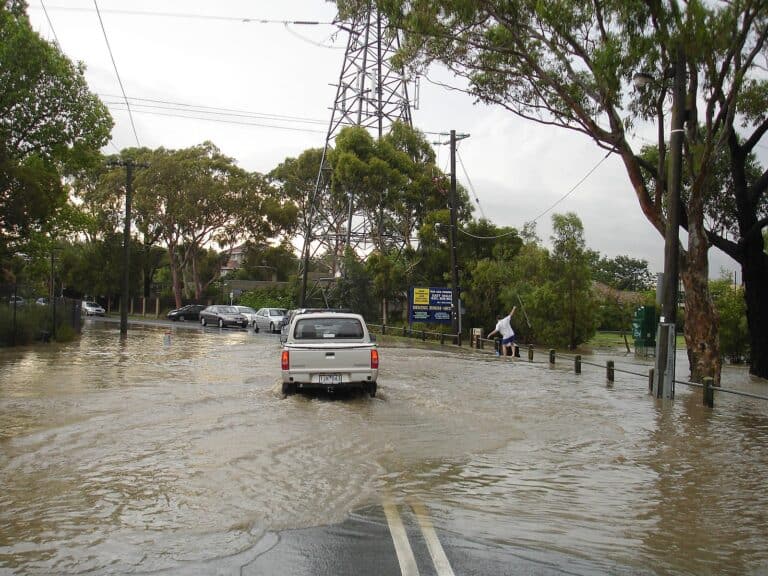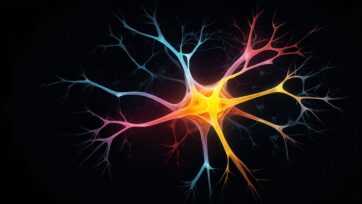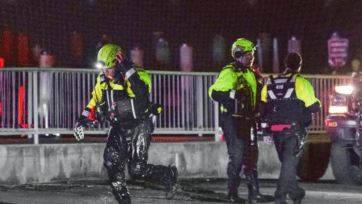(Image credit: Shootthedevgru at English Wikipedia)
In an innovative leap forward, engineers at Rice University, Houston, TX have developed an advanced AI-based system capable of providing real-time sensing of flooded roads. This groundbreaking technology is designed to enhance public safety by delivering timely and accurate information on road conditions during floods. The system leverages artificial intelligence and a network of sensors to detect and report flooded areas, allowing drivers and emergency services to navigate or avoid hazardous routes more effectively.
The Technology Behind the System
The core of this new system is a sophisticated AI algorithm that processes data collected from a network of sensors placed in vulnerable locations. These sensors, which can be easily installed on existing infrastructure such as streetlights and traffic signals, continuously monitor water levels on roadways. The AI system analyzes the data and when water levels exceed safe thresholds and triggers real-time alerts that can be sent to drivers through mobile apps, GPS systems, and other digital platforms.
One of the key advantages of this system is its ability to provide real-time updates. Traditional methods of monitoring flooded roads rely heavily on reports from drivers or emergency responders, which can be delayed or inaccurate. In contrast, Rice University’s AI system offers instantaneous detection, allowing for quicker response times and more informed decision-making by drivers and authorities.
Collaboration and Impact
This development is the result of a collaborative effort between Rice University’s engineering department and local government agencies in Houston, a city that has experienced significant flooding in recent years. The system was tested in a pilot program where it successfully identified flooded areas during heavy rainfall events, providing valuable data that helped to mitigate risks and direct traffic away from dangerous conditions.
The potential applications of this technology extend beyond flood detection. With further development, similar AI systems could be adapted to monitor other types of natural disasters or environmental hazards, such as landslides or wildfires, offering a versatile tool for public safety and disaster management.
Systems Engineering Perspective
From a systems engineering perspective, the AI-based flood detection system exemplifies the importance of integrating various components—sensors, data processing algorithms, communication networks, and user interfaces—into a cohesive and reliable system. The success of this system hinges on the seamless operation of these components, requiring rigorous design, testing, validation, and continuous monitoring to ensure accuracy and reliability. Systems engineering techniques, such as redundancy, robustness, and real-time feedback loops, are crucial in maintaining the system’s performance, especially during extreme weather conditions when accuracy and speed are paramount. This innovation also highlights the growing role of AI and machine learning in systems engineering, where predictive analytics and real-time decision-making are becoming increasingly vital in managing complex, dynamic environments.
This AI system not only represents a significant advancement in flood management but also serves as a model for future innovations in smart infrastructure, where technology and engineering converge to create safer environments and more resilient communities.
References
Tech Xplore 2024, ‘Engineers develop AI system for real-time sensing of flooded roads’, viewed 2nd September 2024, <https://techxplore.com/news/2024-08-ai-real-roads.html>
Rice University 2024, ‘Rice engineers develop AI system for real-time sensing of flooded roads’, Environmental News Network (ENN), viewed 2nd September 2024, <https://www.enn.com/articles/75140-rice-engineers-develop-ai-system-for-real-time-sensing-of-flooded-roads>
ScienceDaily 2024, ‘Engineers develop AI system for real-time sensing of flooded roads’, ScienceDaily, viewed 2nd September 2024, <https://www.sciencedaily.com/releases/2024/08/240828154744.htm>
iHLS 2024, ‘Data-Fusion and AI Help Detect Flooded Roads’, iHLS, viewed 2nd September 2024, <https://i-hls.com/archives/125308>
Shootthedevgru 2007, “Driving through flash flood [Photograph]”, Wikimedia Commons, viewed 18th September 2024 <https://commons.wikimedia.org/wiki/File:Driving_through_flash_flood.jpg>


























